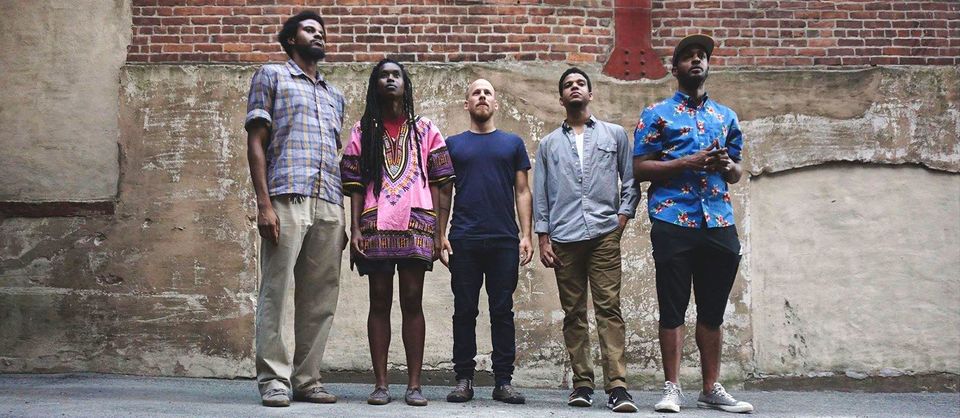
On Friday, July 14, escape the DC heat with a night full of jazz and rock-n-roll at our Summer Luce Unplugged Community Showcase featuring Irreversible Entanglements and Ian Svenonius. Irreversible Entanglements, a collaborative free jazz project, is made up of members from all over the East Coast including Washington DC, Philadelphia, and New York City. It also features spoken word artist, Camae Ayewa, also known as Moor Mother. We spoke with Luke Stewart, bassist of the band, to hear more about why their music is rooted deep within spoken word traditions and free jazz, and how their shared politics continues to push them to create powerful, inspiring music.
Eye Level: Tell us about Irreversible Entanglements.
Luke Stewart: This band was inspired by the New York Art Quartet (NYAQ) with Amiri Baraka, a key ensemble in the 1960s Avant-garde jazz movement in New York City. Many of the issues Baraka addressed in his poetry during that time are still current, sometimes even more deeply troubling. He wrote about the rebellion in Newark; today, Camae Ayewa writes about Ferguson. Baraka wrote "Black Dada Nihilismus," Ayewa writes about "Black Quantum Futurism." The music, while influenced by the so-called Free Jazz movement, is written and performed with contemporary thoughts and feelings. It is a dynamic that draws from the past, addresses the present, and imagines a better future.
EL: What messages do you hope to communicate through your music?
LS: The world of sound is one of the most potent forces for change. As an instrumentalist and especially as an improviser, the messages stem from a collection of thoughts and experience. When we come together as this group, our individualities are focused into this free-wheeling, intensely beautiful group rooted in the history of this music and poetry. How we came together and who we are as people makes our intense message clear.
EL: How would you describe the DC jazz community?
LS: There's so much I could say, but let me keep it simple. The community has been a strong aspect in my life, on and off the bandstand. We experience lessons on life and perspectives on music through conversations and comradery among elders and peers. While here in DC, my path has introduced me to many people who have contributed to the music. And I am proud to have developed here because of the city's deep and strong community, with its history and legacies.
Just like DC's storied and over-told punk scene, the jazz community here has been essential to the history of music. Due to economic pressures, access, and a myriad of other factors, jazz has been the most marginalized of the popular music communities. However, when looking at its history, from Miles Davis to Christian Scott, Thelonious Monk to Jason Moran, DC's jazz community continues to produce musicians who share the stage with the "greats" at the highest level. And often times, the "greats" find themselves here in our community.
EL: Who are your musical inspirations?
LS: So very many. As I mentioned before, the New York Art Quartet featuring Amiri Baraka. I was lucky enough to have had quite a few personal interactions with him through DC jazz radio station WPFW and a mentor who was his personal friend and business partner. He was one of the greatest minds of the 20th and 21st centuries, whose work continued to develop until his death in 2014. I was also fortunate enough to have seen John Tchicai perform a few times before his death a few years ago. I've had some beautiful interactions with Milford Graves, who is still an inspiring figure. Roswell Rudd is still around and performing in New York and elsewhere. Also bassist Reggie Workman, who continues to teach and perform around the world.
There's a beautiful film profiling NYAQ, made by my friend Alan Roth called, "The Breath Courses Through Us." I introduced it when it premiered at the Library of Congress. There's also a very limited box set profiling the group, called "Call it Art," compiled by scholar Ben Young. Both of these together offer a great look into the group and their importance in the greater history of jazz. To me they are a great representation of the musical innovations of the '60s and continue to influence my work today.
EL: How do you foster each other's creativity?
LS: We all have individual paths in music and in life. When we come together our openness helps to create a synergy that hopefully gives the experiencer something to feel.
Hear Irreversible Entanglements play live this Friday, July 14th, and check out more details on the Luce Center's Facebook page. During the performance, enjoy free beer tastings from Port City Brewery, among other libations and snacks from a cash bar. The Luce Unplugged Community Showcase is presented in part by Washington City Paper.

















